Columbia Prof.: Our Faculty Jumped in to Help Protesters After Ignoring Plight of Jewish Students
ABRAMS: “Joining us now is Hagar Chemali, she’s an adjunct associate professor at Columbi University’s School of International and Public Affairs, she’s an expert on national security and foreign affairs. Thanks very much for coming on the program, appreciate it. So you have seen the protests on Columbia’s campus first-hand. You know, in the previous hour here on NewsNation, we saw people with different perspectives coming on, you know, the folks who want to defend the protests are telling us, ‘Oh, come on, they’re just typical protest, they’re just peaceful, they’re not interrupting anything.’ What is your perception of what you’ve seen?”
CHEMALI: “So, I should be clear, I was there last Thursday and I was there on Saturday, and I was horrified by what I saw. And definition of ‘peaceful’ is is an interesting way to put it, because it doesn’t mean that the protests on campus — that’s within the the gates of Columbia — were violent. I didn’t see anybody throwing anything. But that doesn’t mean that the messages weren’t inciting violence, inciting hate or anti-Semitic. I walked by the protests during Saturday afternoon, and I saw two posters of terrorists, the faces of terrorists staring at me back in the face. I used to work in counterterrorism when I was in the U.S. government, and when I saw those photos, I was stunned. I just — I stopped breathing. I couldn’t believe what I was looking at. And perhaps the students aren’t aware of who these individuals are, except I’m pretty sure, if you’ve got into Columbia, you know how to use Google, and so the responsibility is on them. One of them as an individual tied to the Popular Front for the Liberation of Palestine. That is a U.S..designated terrorist organization. And the other is a former spokesperson for Palestinian Islamic Jihad, also a U.S.-designated terrorist organization which, by the way, is currently holding hostages in Gaza right now. Now, I have to tell you that I’ve learned that today those posters were taken down. I don’t know if the students did it proactively, if the administration did. Either way, that’s the right move. And so what I saw on Saturday was peaceful in that it wasn’t physically violent, but hostile messaging. And by Saturday night, they had turned into violent rhetoric, calls for intifada and violent protests outside of the campus.”
ABRAMS: “Does it make you not want to teach at Columbia anymore?”
CHEMALI: “No, because, listen, in my view, and I had this since the fall, I had really constructive conversations with my students, because at the end of the day, these are students and when you — and there is a role that Columbia needs to play here in leading and guiding and educating them. And you have to teach them — “
ABRAMS: “But not with the professors you have there. I mean, it’s not just the students don’t — I apologize for interrupting you, but you have a lot of professors walking out as well to ‘support the students.’ So it’s not just students here.”
CHEMALI: “You know, that’s fair. So, when I saw the protests of the professors yesterday, I was — I was really displeased with that, and the reason is because, if their argument — their argument is that they are doing it to protect students and that they view that one of the key responsibilities of a professor is to protect a student regardless of that student’s views. Fine. No, I don’t have a problem with that per se. But if that is your argument, then where were those professors in protecting the Jewish students when they were being verbally attacked, when some of them had their yarmulkes lopped off their heads, when some of them had their Israeli flags taken and shredded or burned? Where were they with that? They were Jewish students who required escorts to go to seder dinners? That is a New York City in 2024 in America. That’s absurd and I don’t see the professors being equal about that.”
ABRAMS: “Well, and more than that, Columbia decided to hold classes virtually last night from now on, for the rest of the semester. That’s what you’re going to get for the — you know, whatever the tens of thousands of dollars people are paying every year to go to Columbia University? They’re going to get this, basically an online education now, because these protesters have won.”
CHEMALI: “Right. I really don’t like the decision about the virtual part. So yesterday, Monday, we were virtual, completely virtual, and then today onward, until the end of the semester, we are following a what’s called a hybrid model, which means that we can be in person, but we offer virtual for students who feel unsafe. And I agree with you Dan, I don’t understand why we’re the ones who have to stay home because of the unsafe environment that the protesters have created. It should be the other way around. It should be that those creating the unsafe or hostile environment should be removed or should be stopped. And by the way — and I would add this, and this is an important distinction — even if the protests on campus today, for example, today they were — they appear peaceful. And while I appreciate that, I know that those students have invited outside agitators to come to the gates, to bang on those gates loudly, to shout anthems in support of Hamas, to call for the burning of Tel Aviv, and to shout anti-Semitic remarks at your students. So they’re separate but related, and those students have a responsibility that they’re not fulfilling.”
ABRAMS: “Here’s the Columbia president talking about her perspective on it. Let’s listen number one.”
[Clip starts]
SHAFIK: “When I first started at Columbia, our policies, our systems and our enforcement mechanisms were not up to the scale of this challenge. They were — they were designed for a very different world. They were designed for a student cheating on an exam.”
[Clip ends]
ABRAMS: “I mean, look, again, I give the president credit for bringing in the police department. She’s taken a lot of heat of from the protesters over that. But, you know, Columbia feels like it’s been looking for this to happen. It looks like a lot of these. Agitators have been looking for an excuse. And I say that because, again, why would they do it now, right? Israel just withheld an overwhelming response to Iran, right? They did a symbolic hit. I could see, when Israel overreacts and suddenly, you know, thousands are dead in Iran and people say, ‘You know what? Enough is enough. You’ve got Gaza, now you’ve got Iran.’ Instead, Israel just came off of showing enormous restraint here. I don’t even get it.”
CHEMALI: “Well, after October 7, only days after, you had massive protests at Columbia that were anti-Israel in nature, and I was horrified back then too, by the way. And you’re right, I mean, when we saw this assault by Iran, which a lot of people and pundits wanted to claim that they were designed for detection — and I can tell you, having worked in the U.S. government for 12 years, including on wars, they were not designed to be disrupted, they were designed to get missiles through. That’s why there were so many of them. They didn’t get through because the U.S. and Israel worked together with our partners, by the way, to deflect all of them. But that said, I agree with you. After the Iranian assault, there were — I heard that on Whatsapp chains amongst student groups, that there were students praising the Iranian regime’s assault, which mortifies me.”
ABRAMS: “Of course. Of course. This is my point. That Israel can’t win. Anyway, Hagar, thank you so much for coming on the show, really appreciate it.”
CHEMALI: “Thanks.”
-
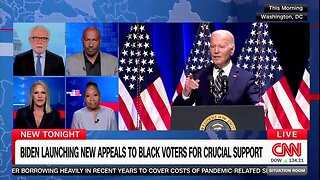 1:22
1:22
Grabien
20 hours agoAlice Stewart: Trump Team Is ‘Working Very Hard to Try and Win Over Black Voters’
54 -
 8:33
8:33
MichaelBisping
23 hours agoBISPING Reacts: "Tyson Fury COULDN'T Keep The Pace!" | Tyson Fury vs Oleksandr Usyk Reaction
2.27K2 -
 9:56
9:56
Misha Petrov
9 hours agoTragic Leftist Transformations
2.76K23 -
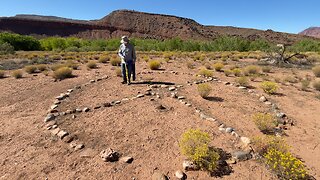 31:48
31:48
CarlCrusher
9 hours agoCurse of the Skinwalker | The Ancient Mystery of Magic Mesa - Full Documentary | Part 2
1.96K3 -
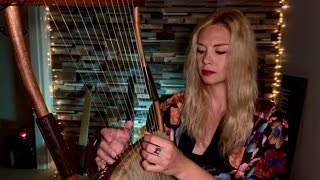 1:38
1:38
AnthiBozoviti
16 hours agoImprovisation on Ancient Greek Lyre | Anthi Bozoviti
8302 -
 LIVE
LIVE
World Poker Tour
27 days agoWPT Live!
688 watching -
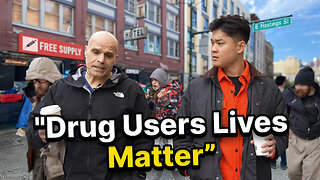 25:30
25:30
GEN
2 days ago $0.03 earnedWhat Happens When a City Decriminalizes All Drugs?
33.7K138 -
 LIVE
LIVE
Major League Fishing
3 days agoLIVE Tackle Warehouse Invitationals, Heavy Hitters, Day 2
186 watching -
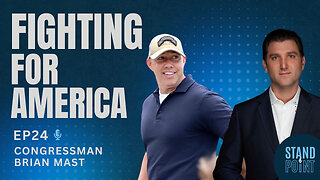 37:24
37:24
Standpoint with Gabe Groisman
13 hours agoEp. 24. Fighting For America. US Congressman Brian Mast (R-FL)
57.8K33 -
 59:12
59:12
Sports Wars
11 hours agoHarrison Butker ATTACKED By Woke Mob, Scottie Scheffler ARRESTED, Bronny James TRASHED By Scouts
70.5K55